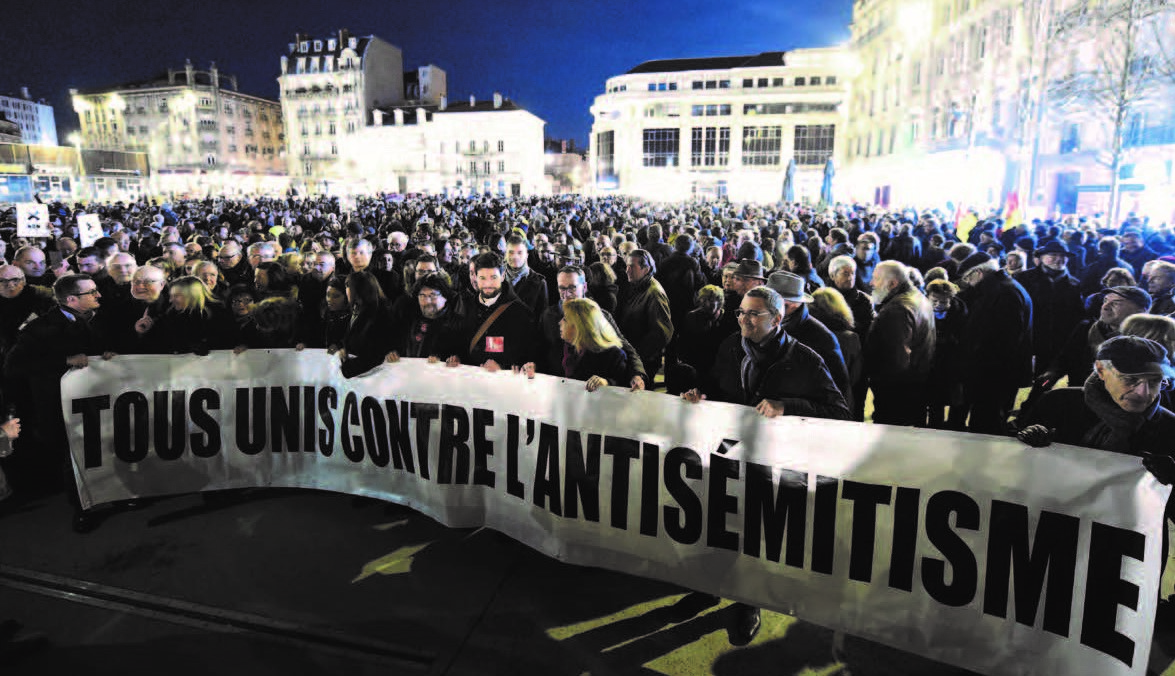
Definition of antisemitism
Antisemitism appears today in many different forms and from all parts of society.
The non-legally binding working definition of the International Holocaust Remembrance Alliance (IHRA) is an essential tool for the Commission’s work on tackling antisemitism. The Fundamental Rights Agency (FRA) survey among Jewish Europeans shows that the examples in the definition reflect what the vast majority perceives as antisemitic. The Commission considers the definition a benchmark for promoting a human rights-based and victim-centred approach to fight antisemitism.
The Commission recommends the IHRA definition as a useful tool, in particular for education and training purposes for teachers, NGOs, state authorities and the media in line with the 2024 Council declaration on fostering Jewish life and combating antisemitism, the 2022 Council Conclusions on combating racism and antisemitism and the 2018 EU Council declaration on combating antisemitism. As also stated in the first progress report of the EU Strategy on combating antisemitism and fostering Jewish life, to this date, 25 EU Member States have adopted or endorsed the IHRA working definition of antisemitism.
Antisemitic acts are criminal when they are so defined by law and in those cases they need to be prosecuted. At EU level, the Framework Decision on combating certain forms of expressions of racism and xenophobia provides a strong legal framework to combat antisemitic hate crimes and hate speech. The Commission continues to encourage the Member States to prosecute antisemitic hate crimes and hate speech in the light of these common legal provisions. It is equally determined to uphold freedom of expression, emphasizing the need to exercise due diligence when identifying antisemitic incidents to ensure that freedom of expression is protected for all.
On 8 January 2021, the European Commission together with the IHRA and with the support of the 2020 German Presidency of the Council of the European Union published a handbook for the practical use of the IHRA working definition of antisemitism. The handbook provides an overview of good practices by international organisations, national administrations, civil society and Jewish communities from across Europe. The 35 good practices are ranging from training for law enforcement to incident recording and reporting. Furthermore, the handbook includes 22 sourced incidents of antisemitism in Europe that highlight the relevance of the IHRA working definition of antisemitism when assessing manifestations of antisemitism.
On 29 November 2018, the EU acquired a Permanent International Partnership with the International Holocaust Remembrance Alliance. The participation of the EU in this international body allows for closer cooperation on combating Holocaust denial and preventing racism, xenophobia and antisemitism.
The IHRA Working Definition of Antisemitism
On 26 May 2016, the IHRA Plenary in Bucharest decided to adopt the following working definition of antisemitism:
Antisemitism is a certain perception of Jews, which may be expressed as hatred toward Jews. Rhetorical and physical manifestations of antisemitism are directed toward Jewish or non-Jewish individuals and/or their property, toward Jewish community institutions and religious facilities.
Manifestations might include the targeting of the state of Israel, conceived as a Jewish collectivity. However, criticism of Israel similar to that levelled against any other country cannot be regarded as antisemitic.
Antisemitism frequently charges Jews with conspiring to harm humanity, and it is often used to blame Jews for “why things go wrong.” It is expressed in speech, writing, visual forms and action, and employs sinister stereotypes and negative character traits.
Contemporary examples of antisemitism in public life, the media, schools, the workplace, and in the religious sphere could, taking into account the overall context, include, but are not limited to:
- Calling for, aiding, or justifying the killing or harming of Jews in the name of a radical ideology or an extremist view of religion;
- Making mendacious, dehumanising, demonising, or stereotypical allegations about Jews as such or the power of Jews as a collective — such as, especially but not exclusively, the myth about a world Jewish conspiracy or of Jews controlling the media, economy, government or other societal institutions;
- Accusing Jews as a people of being responsible for real or imagined wrongdoing committed by a single Jewish person or group, or even for acts committed by non-Jews;
- Denying the fact, scope, mechanisms (e.g. gas chambers) or intentionality of the genocide of the Jewish people at the hands of National Socialist Germany and its supporters and accomplices during World War II (the Holocaust);
- Accusing the Jews as a people, or Israel as a state, of inventing or exaggerating the Holocaust;
- Accusing Jewish citizens of being more loyal to Israel, or to the alleged priorities of Jews worldwide, than to the interests of their own nations;
- Denying the Jewish people their right to self-determination, e.g., by claiming that the existence of a State of Israel is a racist endeavor;
- Applying double standards by requiring of it a behaviour not expected or demanded of any other democratic nation;
- Using the symbols and images associated with classic antisemitism (e.g., claims of Jews killing Jesus or blood libel) to characterise Israel or Israelis;
- Drawing comparisons of contemporary Israeli policy to that of the Nazis;
- Holding Jews collectively responsible for actions of the state of Israel.
Antisemitic acts are criminal when they are so defined by law (for example, denial of the Holocaust or distribution of antisemitic materials in some countries).
Criminal acts are antisemitic when the targets of attacks, whether they are people or property – such as buildings, schools, places of worship and cemeteries – are selected because they are, or are perceived to be, Jewish or linked to Jews.
Antisemitic discrimination is the denial to Jews of opportunities or services available to others and is illegal in many countries.
